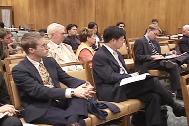(Clearwisdom.net) June 9th report: Will SARS affect China's economy? Is it a great opportunity for China's political system to become more open and transparent? Experts expressed their opinions at the June 5th hearing held by the US - China Economic and Security Review Commission. Mr. Larry Wortzel, from one of the most respected US members of the think-tank, the Heritage Foundation, revealed that even to this day, the Chinese government admits only 24% of its bank accounts are corrupt, which is only half of the widely acknowledged percentage by independent research institutions. It seems as long as lies have not affected the international community and have not been exposed in public, systemic transparency will not become a reality.
China's Government Debt Accounts for 70%-80% of Her Annual GDP (Gross Domestic Product)
Mr. Tao Dong, chief economist for non-Japan Asia from Credit Suisse First Boston said that after the SARS epidemic was revealed, consumer spending in China declined dramatically. The May 1st holiday used to be the longest spending and touring season next to the Chinese New Year, but this year retail sales declined by 70% in Beijing and 30% in Shanghai, Chongqing City and others, but after mid-May, consumer spending noticeably climbed back up. In the first quarter, China's economic growth was 9.9%, the quarter 7%. In the second half of 2003, the government will continue to use active economic expansion policy to stimulate the economy, they might contribute funds of 50 billion Yuan. Earlier this year, many experts and scholars questioned this policy, for it will lead to huge government debts and economic deficits. According to one estimate, China's current debt is as much as 33% of the annual GDP; if we include corrupt bank accounts, the debt accounts for 70% to 80% of the annual GDP.
U.S. experts expressed their opinions at the June 5th hearing held by the US - China Economic and Security Review Commission
Other than economic expansion, another major stimulant for China's rapid economic growth is foreign investment. According to an investigation conducted by CSFB on forty international corporations, right now none of them have changed their investment strategies in China. It was learned that two types of foreign investors who were affected by SARS. The first are those who just went to China, another are those with many business connections in China. The first segment of investors have not taken a strong foothold and the second has a close connection with China, so SARS greatly inconvenienced their business transactions.
Tao Dong said he thinks there are three curves: the first one is the SARS epidemic curve. Following it are the consumer spending curve and investment confidence curve. Some medical experts are worried that SARS will make a comeback after this summer, which may be a significant issue in terms of these three curves.
Lies on Economy Not Yet Exposed
Mr. Larry Wortzel from the Heritage Foundation said that he has reservations how much the Chinese government will open up because of SARS. He thought that, because even to this day the Chinese government admits only 24% of its bank accounts are corrupt, which is one-half of the number widely acknowledged by independent research institutions, it seems as long as lies have not affected the international community and have not been exposed in public, systemic transparency will not become a reality.
Whether economic development will help advance political liberalization, Mr. Wortzel thought there is hardly a direct relation between the two. He said, the "Heritage Foundation and the Wall Street Journal published a world economy freedom index, and Hong Kong is number one. But if you listen to Martin Chu-ming Lee's speech [founder and chairman of the Hong Kong Democratic Party], you will be told the political freedoms over there are not only limited, but will be reduced as Article 23 is passed and applied."






